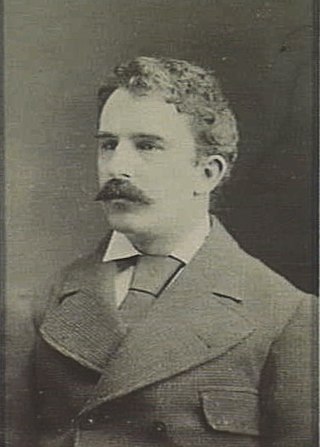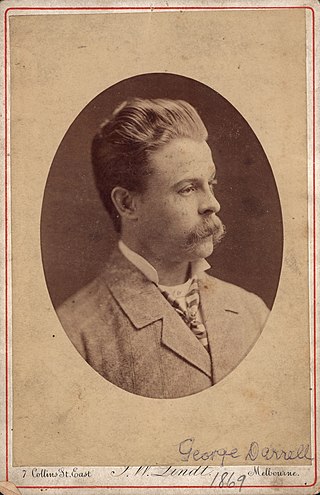Related Research Articles

Alfred Dampier was an English-born actor-manager and playwright, active in Australia.

Edmund Duggan was an Irish-born actor and playwright who worked in Australia. He is best known for writing a number of plays with Bert Bailey including The Squatter's Daughter (1907) and On Our Selection (1912). His solo career was less successful than Bailey's. His sister Eugenie was known as "The Queen of Melodrama" and married noted theatre producer William Anderson, for whom Duggan frequently worked as an actor, writer and stage manager.
The MacMahon brothers were entrepreneurs in Australian show business. Chief among them were James MacMahon and Charles MacMahon, who together and separately toured a large number of stage shows. Their younger brothers, Joseph and William, were involved in many of those activities.
The Sunny South, or the Whirlwind of Fate is a 1915 Australian silent film directed by Alfred Rolfe based on the popular play The Sunny South by George Darrell. It is considered a lost film.

George Frederick Price Darrell (1851–1921) was an Australian playwright best known for The Sunny South (1883), which was made into a film The Sunny South or The Whirlwind of Fate.
The Lorgnette, subtitled "Theatrical Journal and Programme", was a weekly magazine in Melbourne, Australia, devoted to theatre, opera and the concert stage. The magazine was published Saturdays and sold for 2d at the major entertainment venues where it had exclusive rights, and elsewhere.
Eduardo Majeroni was an actor who toured the world with Adelaide Ristori, playing popular Italian dramas in their original language. He and his wife Giulia, a niece of Ristori, left the company in Australia and carved out a career playing the same repertoire in English translations. Giulia was an actress, and their two sons Mario and George had acting careers in America.
The Melbourne Garrick Club was an association of people with interests in the theatre, founded in 1855, and disbanded around 1866 after the death of one of its "leading lights".
Frank Towers (1835–1886) was an English actor, playwright and stage producer.

William James Holloway, known professionally as W. J. Holloway, was an Australian actor and stage manager who after some successes moved to London, from where he made several tours of South Africa. He married twice; and recognising the talent of his second wife's daughter, developed it to the full and drove her, as Essie Jenyns, to fame and exhaustion. He also made competent actors of his own children; he was an excellent teacher.
Edmund Holloway was an Australian actor.
Frank Harvey was the nom de plume of John Ainsworth Hilton, born Jean François de Soissons de Latanac, actor and playwright, who was born and died in Manchester, England. His plays were popular in Australia.

George Paul Carey was an Australian actor and manager.
Frederick Charles Appleton was an Australian actor, noted as a Shakespearean character actor, a "painstaking studious aspirant for histrionic honours", praised for his "considerable ability and tact". In 1883 he earned an academic degree and became a university lecturer, an unusual conjugation of careers, shared with H. B. Irving.
William Hoskins was a Shakespearean actor from England whose later career was mostly in Australia and New Zealand, reputedly "one of the best actors who has ever trod our stage".
Stuart O'Brien was an Irish-born actor and manager in Australia.
Charles Holloway was a stage actor and manager in Australia.

Louise M. Pomeroy née Ryder was an American actress and writer who was popular in Shakespearean roles in Australia.
John Thomas Hill KS RAM was a church organist, choirmaster and orchestra conductor in Australia. He is remembered for his brief marriage to the prima donna Ilma de Murska.
Eleanor Carey was a stage actor in Australia and America.
References
- ↑ William H. Wilde; Joy Hooton; Barry Andrews (1994). The Oxford Companion to Australian Literature. OUP. ISBN 0-19-553381-X.
- ↑ "Advertising". The Lorgnette . Vol. XXIX. Victoria, Australia. 8 May 1883. p. 3. Retrieved 13 August 2021– via National Library of Australia.
- 1 2 "Advertising". The Age . No. 8771. Victoria, Australia. 29 March 1883. p. 8. Retrieved 14 August 2021– via National Library of Australia.
- ↑ "A Young Australian Actor". The Advertiser (Adelaide) . Vol. XXXIV, no. 10499. South Australia. 11 June 1892. p. 5. Retrieved 13 August 2021– via National Library of Australia.
- ↑ "Colonial Actors". The Herald (Melbourne) . No. 4569. Victoria, Australia. 7 April 1883. p. 2. Retrieved 13 August 2021– via National Library of Australia.
- ↑ "Actors of the Past". The Daily Telegraph (Sydney) . No. 13, 884. New South Wales, Australia. 7 June 1924. p. 13. Retrieved 13 August 2021– via National Library of Australia.
- ↑ ""The Sunny South."". The Lorgnette . Vol. XXVIII. Victoria, Australia. 17 March 1883. p. 4. Retrieved 13 August 2021– via National Library of Australia.
- ↑ "Mr George Darrell". The Lorgnette . Vol. XXXVII. Victoria, Australia. 20 June 1885. p. 2. Retrieved 14 August 2021– via National Library of Australia.
- ↑ "Shipping". The South Australian Advertiser . Vol. XXVII, no. 8256. South Australia. 4 April 1885. p. 4. Retrieved 14 August 2021– via National Library of Australia.
- ↑ "Entertainments, Dramatic and Musical". The Adelaide Observer . Vol. XLI, no. 2216. South Australia. 22 March 1884. p. 25. Retrieved 13 August 2021– via National Library of Australia.
- ↑ 1980 production details at AusStage